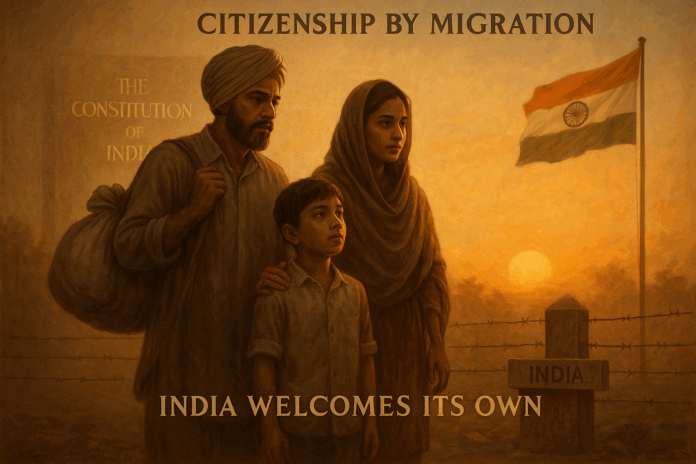When India became independent in 1947, the nation was born anew — but with that birth came the scars of Partition. Millions were displaced. Families torn apart. Borders redrawn. Amidst that chaos, one question echoed in every heart: “Where do I truly belong?”
Article 6 of the Indian Constitution was the answer to that question for many.
🔍 What Does Article 6 Say?
Article 6 grants Indian citizenship to people who migrated from Pakistan to India before July 19, 1948, if:
-
Either the person or their parents or grandparents were born in undivided India, and
-
They came to India before July 19, 1948 and have been residing in India since then, or
-
They came to India after July 19, 1948, registered under a government scheme, and lived at least 6 months in India before registration.
Why It Matters:
It wasn’t just about borders or documents. It was about belonging. About giving people — who left everything behind — a place to call home again.
Imagine a young girl, Amina, who crossed the border with her parents from Lahore to Amritsar in 1947. They had no land, no wealth, just hope. Article 6 gave her what Partition took away — a legal identity, a future, and the dignity of being called an Indian.
The Deeper Meaning:
Article 6 is more than law. It is a symbol of India’s compassion, inclusive democracy, and moral courage. It reflects the vision of our Constitution makers — led by Dr. B.R. Ambedkar — who knew that citizenship is not just about origin, but about belonging.
It tells the world:
“In India, we don’t just protect borders. We protect people. We give shelter. We give identity. We give hope.”
In the story of India’s independence, Article 6 is the chapter that speaks of healing, of welcoming, and of starting again. It reminds us that every Indian citizen carries a story, and the Constitution carries them all — with justice, equality, and humanity.
🪔 Let’s honor that spirit. Let’s never forget — being Indian is not just about birth, it’s also about heart.





